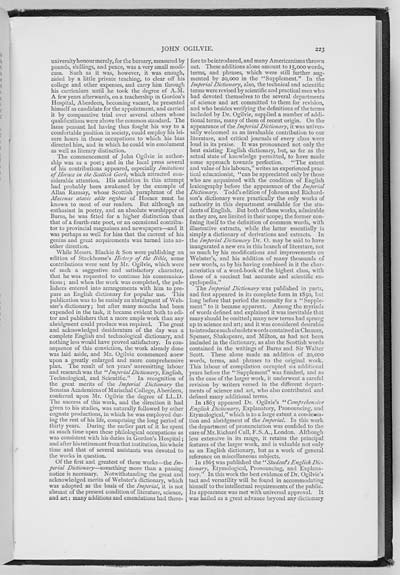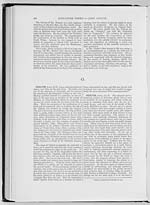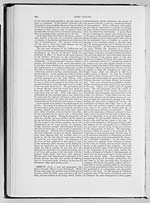223
university honour merely, for the bursary, measured by
pounds, shillings, and pence, was a very small modi-
cum. Such as it was, however, it was enough,
aided by a little private teaching, to clear off his
college and other expenses, and carry him through
his curriculum until he took the degree of A.M.
A few years afterwards, on a teachership in Gordon's
Hospital, Aberdeen, becoming vacant, he presented
himself as candidate for the appointment, and carried
it by comparative trial over several others whose
qualifications were above the common standard. The
lame peasant lad having thus fought his way to a
comfortable position in society, could employ his lei-
sure hours in those occupations to which his bias
directed him, and in which he could win emolument
as well as literary distinction.
The commencement of John Ogilvie in author-
ship was as a poet; and in the local press several
of his contributions appeared, especially Imitations
of Horace in the Scottish Garb, which attracted con-
siderable attention. His ambition in this attempt
had probably been awakened by the example of
Allan Ramsay, whose Scottish paraphrase of the
Maecenas alavis edite regibus of Horace must be
known to most of our readers. But although an
enthusiast in poetry, and an absolute worshipper of
Burns, he was fitted for a higher distinction than
that of a fourth-rate poet, or an occasional contribu-
tor to provincial magazines and newspapers�and it
was perhaps as well for him that the current of his
genius and great acquirements was turned into an-
other direction.
While Messrs. Blackie & Son were publishing an
edition of Stackhouse's History of the Bible, some
contributions were sent by Mr. Ogilvie, which were
of such a suggestive and satisfactory character,
that he was requested to continue his communica-
tions ; and when the work was completed, the pub-
lishers entered into arrangements with him to pre-
pare an English dictionary for popular use. This
publication was to be mainly an abridgment of Web-
ster's dictionary; but after many months had been
expended in the task, it became evident both to edi-
tor and publishers that a more ample work than any
abridgment could produce was required. The great
and acknowledged desideratum of the day was a
complete English and technological dictionary, and
nothing less would have proved satisfactory. In con-
sequence of this conviction, the work already done
was laid aside, and Mr. Ogilvie commenced anew
upon, a greatly enlarged and more comprehensive
plan. The result of ten years' unremitting labour
and research was the "Imperial Dictionary, English,
Technological, and Scientific." In recognition of
the great merits of the Imperial Dictionary the
Senatus Academicusof Marischal College, Aberdeen,
conferred upon Mr. Ogilvie the degree of LL.D.
The success of this work, and the direction it had
given to his studies, was naturally followed by other
cognate productions, in which he was employed dur-
ing the rest of his life, comprising the long period of
thirty years. During the earlier part of it he spent
as much time upon these philological occupations as
was consistent with his duties in Gordon's Hospital;
and after his retirement from that institution, his whole
time and that of several assistants was devoted to
the works in question.
Of the first and greatest of these works�the Im-
perial Dictionary�something more than a passing
notice is necessary. Notwithstanding the great and
acknowledged merits of Webster's dictionary, which
was adopted as the basis of the Imperial, it is not
abreast of the present condition of literature, science,
and art: many additions arid, emendations had there-
fore to be introduced, and many Americanisms thrown
out. These additions alone amount to 15,000 words,
terms, and phrases, which were still further aug-
mented by 20,000 in the "Supplement." In the
Imperial Dictionary, also, the technical and scientific
terms were revised by scientific and practical men who
had devoted themselves to the several departments
of science and art committed to them for revision,
and who besides verifying the definitions of the terms
included by Dr. Ogilvie, supplied a number of addi-
tional terms, many of them of recent origin. On the
appearance of the Imperial Dictionary, it was univer-
sally welcomed as an invaluable contribution to our
literature, and critical journals of every class were
loud in its praise. It was pronounced not only the
best existing English dictionary, but, so far as the
actual state of knowledge permitted, to have made
some approach towards perfection. "The extent
and value of his labours," writes an experienced prac-
tical educationist, "can be appreciated only by those
who are acquainted with the condition of English
lexicography before the appearance of the Imperial
Dictionary. Todd's edition of Johnson and Richard-
son's dictionary were practically the only works of
authority in this department available for the stu-
dents of English. But both of these works, admirable
as they are, are limited in their scope; the former con-
fining itself to the definition of common words, with
illustrative extracts, while the latter essentially is
simply a dictionary of derivations and extracts. In
the Imperial Dictionary Dr. O. may be said to have
inaugurated a new era in this branch of literature, not
so much by his modifications and improvements on
Webster's, and his addition of many thousands of
new words, as by his having combined in it the char-
acteristics of a word-book of the highest class, with
those of a succinct but accurate and scientific en-
cyclopedia."
The Imperial Dictionary was published in parts,
and first appeared in its complete form in 1850, but
long before that period the necessity for a "Supple-
ment" to it became apparent. Among the myriads
of words defined and explained it was inevitable that
many should be omitted; many new terms had sprung
up in science and art; and it was considered desirable
to introduce such obsolete words contained in Chaucer,
Spenser, Shakspeare, and Milton, as had not been
included in the dictionary, as also the Scottish words
contained in the writings of Burns and Sir Walter
Scott. These alone made an addition of 20,000
words, terms, and phrases to the original work.
This labour of compilation occupied six additional
years before the "Supplement" was finished, and as
in the case of the larger work, it underwent a careful
revision by writers versed in the different depart-
ments of science and art, who also contributed and
defined many additional terms.
In 1863 appeared Dr. Ogilvie's "Comprehensive
English Dictionary, Explanatory, Pronouncing, and
Etymological," which is to a large extent a condensa-
tion and abridgment of the Imperial. In this work
the department of pronunciation was confided to the
care of Mr. Richard Cull, F. S. A., London. Although
less extensive in its range, it retains the principal
features of the larger work, and is valuable not only
as an English dictionary, but as a work of general
reference on miscellaneous subjects.
In 1865 was published the " Students English Dic-
tionary, Etymological, Pronouncing, and Explana-
tory." In this work the best evidence of Dr. Ogilvie's
tact and versatility will be found in accommodating
himself to the intellectual requirements of the public.
Its appearance was met with universal approval. It
was hailed as a great advance beyond any dictionary

![]() Universal Viewer |
Universal Viewer | ![]() Mirador |
Large image | Transcription
Mirador |
Large image | Transcription
![]()

